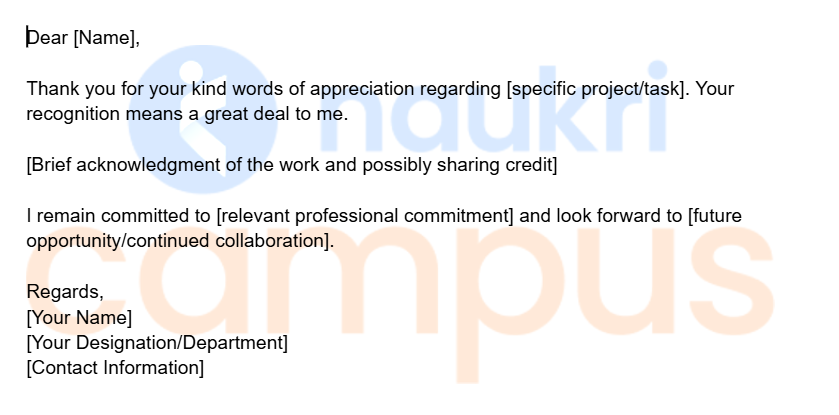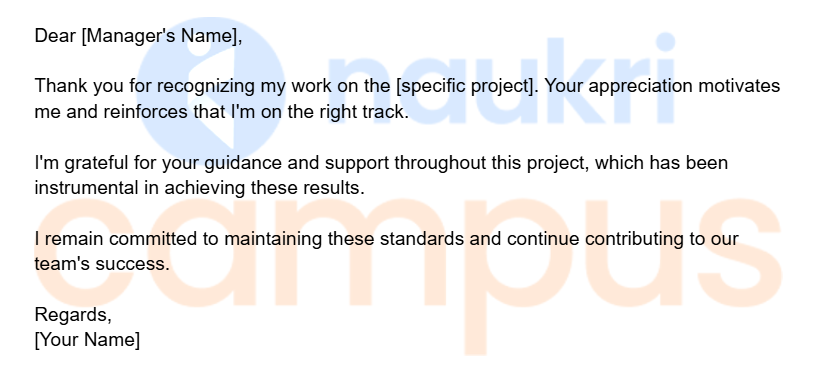In today’s competitive job market, internships are no longer just an extra activity; they have become a must-have for anyone looking to build a successful career. For college students and…

How to Reply to Appreciation Emails from Managers and Colleagues
In the professional world, receiving appreciation is always a welcome experience. However, knowing how to respond appropriately can be just as important as the work that earned the praise. For college students and recent graduates entering the workforce in India, understanding the etiquette of responding to appreciation emails is a valuable skill that can strengthen professional relationships and showcase your communication abilities.
This guide will cover how to reply to appreciation emails with professionalism and gratitude.
What Is a Thank-You Reply for Appreciation?
A thank-you reply for appreciation is a response you write when someone acknowledges your work, effort, or contribution. Unlike regular thank-you notes you write, these replies respond to someone else’s appreciation of you. These responses should be prompt, genuine, and professional while maintaining the appropriate tone based on your relationship with the sender.
In the Indian professional context, where hierarchies and respectful communication are often emphasized, writing these thank-you responses is significant for creating positive impressions with professors, seniors, and managers.
When Should You Respond to Thank-You Emails?
Responding to an appreciation email within 24 hours of receiving it is best. A prompt response shows your attentiveness and sincerity. However, avoid rushing your reply; take a moment to frame a professional yet heartfelt reaction.
Situations when you should respond to a thank-you email:
- When your manager or senior appreciates your work.
- When a professor acknowledges your efforts in a project.
- When a colleague or teammate appreciates your support.
- When a client or mentor sends a thank-you email.
Ignoring an appreciation email can appear unprofessional and seem like you do not value the recognition.
What to Reply to Thank-You Emails
Your response should be short, professional, and appreciative. Here are some general templates for different situations:
Simple Acknowledgment Reply
“Thank you so much! I truly appreciate your kind words and support. Looking forward to continuing my contributions.”
Reply to a Manager’s Appreciation
“Thank you for your appreciation and guidance. Your feedback motivates me to keep improving and contributing to the team’s success.”
Reply to a Colleague’s Appreciation
“Thank you! Working with you has been a great learning experience. I appreciate your support and teamwork.”
Reply to a Professor’s Appreciation
“Thank you, Professor [Name], for your kind words. Your mentorship has been invaluable in shaping my learning experience.”
Reply to a Client’s Appreciation
“Thank you for your kind words. It was a pleasure working on this project, and I look forward to more collaborations in the future.”
Reply to a Team Appreciation Email
“Thank you all for the support! I’m grateful to be part of such an amazing team. Looking forward to more successful projects together.”
Reply to an Appreciation for an Event or Presentation
“I truly appreciate your kind feedback. It was an honor to contribute, and I look forward to participating in more such events.”
Reply to a Peer or Mentor’s Appreciation
“Thank you! Your encouragement means a lot to me, and I hope to continue learning and growing under your guidance.”
Reply to an Appreciation for Extra Effort at Work
“I’m glad my efforts could contribute to the project’s success. Thank you for recognizing my hard work!”
Reply to a Formal Appreciation from Leadership
“I sincerely appreciate the recognition. Being part of this organization is a great learning experience, and I will continue to give my best.”
How to Reply for Appreciation Mail – Format
A well-structured appreciation reply follows this general format:
- Appropriate greeting: Begin with “Dear [Name]” for formal communications or “Hi [Name]” for more casual professional relationships.
- Express gratitude: Start by thanking the sender for taking the time to recognize your work.
- Acknowledge specifics: Reference the specific project, task, or contribution they appreciated.
- Share credit if applicable: Mention team members who contributed if the appreciation was for group work.
- Express commitment: Briefly note your continued dedication to maintaining high standards.
- Close professionally: End with an appropriate closing like “Regards,” “Sincerely,” or “Best wishes,” followed by your name and designation (if applicable).
- Signature: Include your professional signature with contact information for formal communications.
Appreciation Mail Format
Here’s a basic format for responding to appreciation emails:

How to Reply for Appreciation Mail from Manager
Appreciation from your manager deserves special consideration, as it affects your professional relationship and, potentially, your career growth. Here are the elements you should include:
- Express genuine gratitude: Thank your manager specifically for taking the time to recognize your efforts.
- Acknowledge their guidance: Mention how their leadership or guidance contributed to your success.
- Reinforce your commitment: Express your dedication to continued excellence and growth within the team or organization.
- Keep it concise: Managers typically appreciate brief, clear communication that respects their time.
- Maintain professionalism: Even if you have a friendly relationship with your manager, keep your response professional.
Sample Response to Manager’s Appreciation

List of 10 Thank-You Replies for Appreciation
Here are ten versatile templates you can adapt for different professional situations:
- For project completion appreciation: “Thank you for acknowledging my work on the [project name]. Your recognition motivates me to maintain high standards in future assignments. I appreciate the opportunity to contribute to this important initiative.”
- For appreciation of extra effort: “I’m grateful for your kind words regarding my additional hours. It’s rewarding to know that my dedication was noticed and made a difference. Thank you for acknowledging my commitment.”
- For team appreciation where you led: “Thank you for appreciating our team’s effort on [project]. I’m fortunate to work with such talented colleagues whose contributions were vital to our success. I’ll share your appreciation with everyone involved.”
- For problem-solving appreciation: “Thank you for recognizing my solution to the [specific problem]. I appreciate your acknowledgment and am glad I could help resolve the situation. I remain committed to applying creative problem-solving to future challenges.”
- For appreciation from a client: “Thank you for your kind feedback regarding our services. It’s rewarding to know that our work met your expectations. We value your business and look forward to continuing our professional relationship.”
- For appreciation of a presentation: “I appreciate your positive feedback. It’s encouraging to know that the information was valuable and communicated. Thank you for taking the time to share your thoughts.”
- For appreciation from a professor: “Thank you, Professor [Name], for recognizing my work on the [assignment/project]. Your guidance has been invaluable to my academic growth, and I’m grateful for the learning opportunities you provide.”
- For appreciation of mentoring others: “Thank you for acknowledging my mentoring efforts. It’s fulfilling to support colleagues in their professional development. I appreciate your recognition of this aspect of my contribution to the team.”
- For appreciation of handling a difficult situation: “Thank you for recognizing how I managed the challenging situation with [brief description]. Your appreciation validates my approach and provides valuable feedback for handling similar situations in the future.”
- For general work quality appreciation: “I sincerely appreciate your recognition of the quality of my work. Your feedback is valuable and motivates me to maintain these standards. Thank you for taking the time to share this positive feedback.”
Common Mistakes to Avoid When Replying to Appreciation
Even well-intentioned responses can sometimes miss the mark. Avoid these common pitfalls:
- Excessive humility: Saying “it was nothing” or “I don’t deserve this praise” can diminish the sender’s judgment.
- Delayed responses: Waiting too long suggests you don’t value the sender’s recognition.
- Overly casual language: Using slang or informal expressions in formal contexts can appear unprofessional.
- Generic replies: Cookie-cutter responses without personalization can seem insincere.
- Too much self-promotion: Using appreciation responses to highlight additional achievements can appear self-centered.
Knowing how to reply to appreciation mail is essential for both freshers and professionals. A well-crafted thank-you reply strengthens professional relationships and showcases your professionalism and communication skills. Use the provided templates and tips to craft impactful responses to appreciation emails.
FAQs on How To Reply For Appreciation Mail
How quickly should I respond to an appreciation email?
Respond within 24 hours for essential contacts and managers. For general appreciation from colleagues, 48 hours is acceptable, but showing professionalism and respect.
Should I reply to all appreciation emails?
Yes, always respond to appreciation emails, even brief ones. This demonstrates professionalism, strengthens relationships, and shows you value the sender’s recognition.
How formal should my appreciation reply be?
Match your formality to your relationship with the sender and your organization’s culture. Use more formal language with seniors and clients and slightly less formal language with peers.
What if the appreciation was for team effort but sent to me?
Thank the sender, acknowledge it was a team effort, mention key contributors, and offer to share the appreciation with the team.
How to reply to an appreciation email from the CEO or senior leadership?
Express sincere gratitude, acknowledge the honor of recognition, mention specific project details, and affirm your commitment to maintaining high standards.
What’s the best email subject line for appreciation replies?
Use “Thank you” or “Re: [Original Subject]” to maintain the conversation thread and ensure your response is easily identifiable.
How long should an appreciation reply email be?
Keep it concise, typically 3-5 sentences. Express gratitude, acknowledge the specific work, and briefly mention your commitment to excellence.
Should I include additional achievements in my appreciation reply?
No, focus on responding to the specific appreciation. Including additional achievements can appear self-promotional and inappropriate.
How to reply to an appreciation email on LinkedIn?
Thank them professionally, keep it brief, mention your connection, and consider if a follow-up conversation would benefit networking.
Is it appropriate to use emojis in appreciation reply emails?
Use emojis sparingly and only in replies to colleagues you have a casual relationship with. Avoid emojis in formal appreciation replies.
How do you reply to an appreciation email after your resignation?
Express sincere thanks, reflect positively on your experience, mention what you learned, and wish the organization continued success.
What phrases should I avoid in appreciation reply emails?
Avoid “no problem,” “it was nothing,” excessive self-deprecation, overly casual slang, and unnecessarily lengthy explanations.
Latest Posts
Python vs JavaScript: Which Language Should You Learn First?
Choosing the right programming language can shape your career in today’s competitive tech world. Two of the most popular languages among beginners and professionals are Python and JavaScript. If you’re…
AI Trends Transforming Tech and Businesses in 2025!
Artificial Intelligence (AI) is no longer just a futuristic concept, it’s shaping how we live, work, and think. For college students and freshers in India aspiring to build a career…
Software Development Engineer [SDE] – Full Form, How to Become
Software Development Engineers (SDEs) are the backbone of the technology industry, responsible for crafting innovative software solutions that power our digital world. In this extensive guide, we will delve into…
How to Write a Perfect Career Objective for a Freshers’ Resume
A career objective is a concise statement that summarizes your professional objectives. It usually appears at the top of your resume and can help companies figure out what you’re looking…
Popular Posts
Top 21 Highest Paying Jobs in India For Freshers
The Indian job market is evolving rapidly, with new opportunities emerging across various sectors. As a student or fresher, identifying the best career in India that aligns with your interests…
25+ Best Online Courses for Graduates in 2025 [Free & Certified]
In today’s competitive job market, earning a degree is just the beginning. To truly stand out, college students and freshers must constantly upskill, stay updated with industry trends, and gain…
Best CV Formats for Freshers: Simple, Professional & Job-Winning Templates
Creating an effective CV (Curriculum Vitae) is the first step towards landing your dream job or internship as a fresh graduate. Your CV is your initial introduction to potential employers…
Top Computer Science Jobs for Freshers in India
The rapid evolution of technology has created immense opportunities for fresh computer science graduates. With the IT sector expanding globally, India is one of the top countries offering lucrative and…
How to Answer – ‘What Are Your Strengths and Weaknesses?’
Landing your first job is a thrilling yet daunting experience. You’ve meticulously crafted your resume, researched the company, and prepped for potential questions. But there’s one question that throws even…


